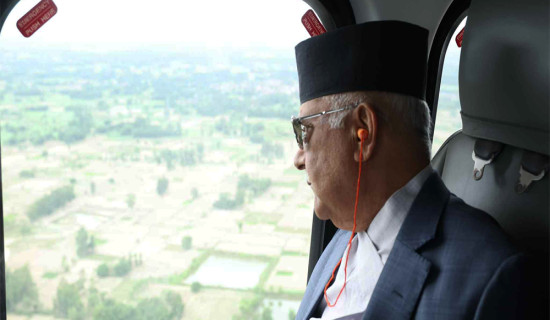- Saturday, 26 July 2025
An Icon's Imprint
'Drashta Drishtima Srashta Vijaya Chalise' is not a single work by its eponymous writer, but rather a comprehensive commemorative volume, a "festschrift," dedicated to dissecting and paying tribute to the enormous literary contributions of Vijay Chalise. Compiled from a series of critical essays, reviews, interviews, and analyses by a group of notable Nepali literary figures, the book is a mosaic of perspectives regarding a writer who has been recognised and prolific in Nepali literature and journalism for more than five decades.
This collection, by doyens like Ramesh Vikal, Yuvaraj Mainali, and many others, forms a vast, if overwhelmingly hagiographic, portrait of a novelist marked by his commitment to social realism and change. It does get the mood of an author whose gigantic body of work ranges from fat mythological novels and bitter social satires to decent travelogues and endearing children's books.
The central theme running through Chalise's diverse body of work, as compellingly argued, is one of intense concern with social responsibility. He is not represented as some artist detached from his environment but as deeply involved with it, using his pen as a mechanism for observation and improvement. The various authors highlight his one-pointed quest to unmask society's ailments, whether it is the exploitation underlying processes like the Deuki system, the ubiquitous corruption pervading political and non-governmental institutions, or the quiet struggles of the commoner against institutional injustice.
His masterpiece, the novel Yugasandhi, is subjected to a thorough analysis as a work of methodology. Here, Chalise creatively reimagines the Vedic era not as a distant, gilded period, but as an ongoing canvas for contemporary critique. He applies mythical characters to discuss issues of caste prejudice, misuse of power, and gender roles, ingeniously interweaving ancient traditions with modern-day sensibilities and even speculative scientific concepts like super-sophisticated armaments and artificial insemination. This ability to make the mythological far-reaching in meaning is one of his most celebrated excellences.
'Drashta Drishtima Srashta Vijaya Chalise's organisational scheme is logical and highly appropriate. Dividing the critical analyses into categories by genre—Fiction (novel and story), Travelogue, Children's Literature, and Interviews—the book makes it feasible to have an intimate look at Chalise's singular contribution to each genre. This segmentation gives the reader a clear-cut, systematic tour of his literary domain. Regarding Chalise's writing style, the reviewers concur that it reflects his extremely long experience as a journalist.
His writing is blunt, simple, and readable, by choice, prioritising clarity of message. While making his work effective, one of his reviews of his short story book 'Khosieko Sapana' rightly notes a lack of stylistic embellishment at times, commenting on repetitive and clumsy sentences. This note of constructive criticism is a much-needed element of balance, otherwise lacking in the uniformly positive reviews.
Setting and characters are robust conveyors of his message in Chalise's work. His characters are often less about intricate psychological exploration and more about representing social forces or the human face of systemic issues. Whether he is the mythic Lopamudra engaging in intellectual combat with her wise husband about social change or a modern village girl struggling against exploitation in the city, his protagonists engage in conflicts that are more than personal.
The setting is equally pivotal. The reviews point out how Chalise roots his stories in Nepal's specific cultural and geographical context, ranging from the Himalayan polyandry cultures to the socio-political context of Kathmandu. This strong sense of place gives his work its authenticity and timeliness. In his travels, the place, particularly in industrially developed nations like Japan, is a mirror held up to reflect and used to critically examine Nepal's development and governance, combining a descriptive account with an immediate sense of patriotic concern.
The greatest strength of this volume lies in its excellent comprehensiveness. It gathers a superb range of literary voices to construct a multi-dimensional image of an author's oeuvre. The book offers a deep, layered understanding by adding reviews in both Nepali and English and an honest interview in which Chalise himself speaks about the state of Nepali literature and institutions. It confirms Chalise's adaptability and his significant, if underrated, status as a conditioner of modern Nepali letters, especially children's writing, in which he is an intermediary figure in sustaining a tradition of intellectual and moral nourishment.
Its main limitation, inherent to the genre of celebratory festschrift, is its overwhelmingly deferential tone. A more detached scholarly critique would have searched for more trenchantly critical or dissident voices to create a sense of dialectical tension. The book is rather a deferential tribute than a wholly objective critical appraisal.
Overall, 'Drashta Drishtima Srashta Vijaya Chalise' is a valuable and thoroughly researched book that can shed much light on the life of a leading Nepali author. It depicts a vivid and consistent picture of Vijay Chalise as a conscientious author whose work in various genres has been spurred by a desire to provoke thought, combat oppression, and bring about a more enlightened world. This is a highly recommended read for Nepali literature students, scholars, and any interested reader. It is an apt tribute to an iconic writer who perfectly embodied the title of ""drashta"—seer that he was—who spent a lifetime holding up a mirror to his nation, always spotlighting its flaws and potential in the hope of igniting change.
(Lama is a poet and translator.)















